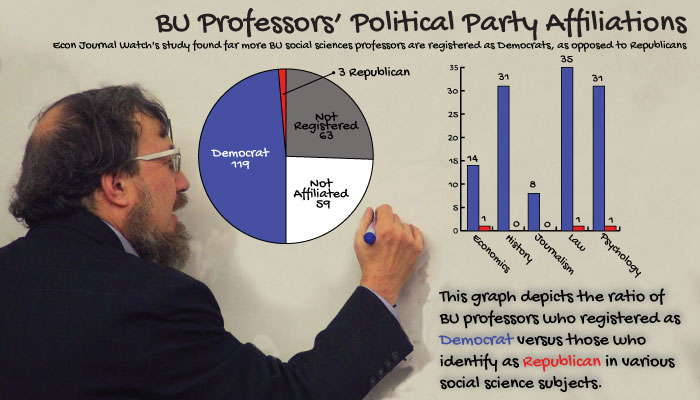
GRAPHIC BY CAROLINE HITESMAN AND SHIVANI PATEL/DAILY FREE PRESS STAFF
As the 2016 presidential election is stepping into countdown mode, many Boston University students may soon cast out their first vote ever. Yet one can’t help but wonder — will what professors say in class impact their students’ political ideology?
Anna Brett, a sophomore in the College of General Studies, doesn’t think so. She said while BU professors tend to be more liberal, they do not impose their personal belief on the students, nor would students be easily persuaded.
“In my writing for communications class, all political views are addressed,” she said. “Personally, what a professor says does not influence my political opinions.”
The ratio of BU social sciences professors registered as Democrats to those registered as Republicans is 40 to 1, according to a study published in the September issue of Econ Journal Watch.
The study examined the voter registration and official party affiliation of 7,243 professors from 40 leading universities across the nation. It specifically focused on professors in economics, history, journalism, communications, law and psychology departments.
Out of those surveyed by the study, BU had one of the largest Democrat-to-Republican ratios, falling second to Brown University (60:1). Among BU’s 244 professors that researchers looked into, 119 are registered as Democrats, three as Republicans and the rest are nonaffiliated or not registered.
While BU professors are allowed to talk about their political perspectives, the university discourages them from advocating their opinions to their students, School of Education Dean Hardin Coleman said.
“If it goes to recruiting people to our perspective, we think that crosses the line of power and privilege,” Coleman said. “We encourage our faculty to find the balance between excitement about what they believe, and how that can be learning and advocacy for their particular point of view.”
The classroom, however, can benefit from having a professor who creates an atmosphere for intellectual discussion, Coleman said.
“[Faculty should] engage intellectual environment where people can engage strongly in understanding ideas and acquire information to make really good decisions,” he said.
Coleman said there are many opportunities for students to voice their concerns if professors are speaking too forcefully about their political opinions. For example, they can complete evaluation forms at the end of every semester.
“Students across the university have the opportunity to express their opinion, and we read them all,” Coleman said. “So if a student labels a faculty member as being inappropriate, we read that, and we take it very seriously.”
For professors, finding a balance seems to be the key when it comes to constructing a comfortable environment with academic freedom, freedom of speech and respectful comments.
“Of course classroom speech is expected to be respectful of all groups, including those who may hold contrary opinions,” College of Communication Dean Thomas Fiedler wrote in an email. “Classroom speech that isn’t respectful … can certainly lead to disciplinary actions.”
Fiedler wrote that COM faculty does not have to alert students before they say something provocative that may offend students.
“COM faculty are not required — nor are they asked — to give ‘trigger warnings’ in their classes or to provide safe spaces protected from provocative speech,” Fiedler wrote.
While students generally agree that professors should have the freedom to express their political opinion, some of them said it’s uncomfortable to learn who their professors are voting for in this election cycle.
Gabi Sears, a sophomore in SED, said she wouldn’t mind if a professor spoke about their political views in class, but professors should not label what is right and what is wrong in this election.
“Everyone’s entitled to their own opinion,” she said. “[But] just because a professor is in a position or at a higher level, [it] doesn’t mean that maybe their opinion should be more important or that I should be intimidated by their opinion.”
Paul Laskoski, a senior in the College of Arts and Sciences, said his professors generally use current events in politics as an ice-breaker, and he would only be bothered if professors tried to change his opinion.
“If they were trying to convince me to go against my own opinion or my own convictions, then that would make me uncomfortable,” he said. “But I would say BU is a pretty open environment and very nurturing to different ideas.”























































































































